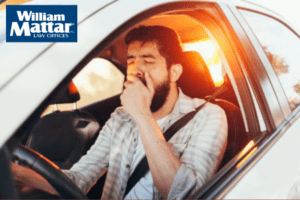June 7, 2022 | By William Mattar, P.C.
The Dangers of Driver Fatigue and Reduced Alertness
 Fatigued driving poses a risk of danger on our roads. A fatigued driver can cause a severe accident, roll off the road, and cause injuries to themselves and others. That is because fatigue can reduce driver alertness. If you have been injured in a car accident caused by a fatigued or drowsy driver, William Mattar, P.C. can help.
Fatigued driving poses a risk of danger on our roads. A fatigued driver can cause a severe accident, roll off the road, and cause injuries to themselves and others. That is because fatigue can reduce driver alertness. If you have been injured in a car accident caused by a fatigued or drowsy driver, William Mattar, P.C. can help.
How Fatigue Affects Driver Alertness
Fatigue can affect alertness, our reaction times, and the ability to respond to a dangerous situation on the road. It can also result in the driver losing consciousness altogether while behind the wheel.
It has been found that driver fatigue has effects similar to driving drunk. Being awake for over 18 hours can be similar to a blood-alcohol rating (BAC) of 0.05% and awake for 24 hours can be equivalent to 0.1% BAC, a higher rate of intoxication than the legal limit to drive in New York.
What Can Cause Driver Fatigue?
Driver fatigue can be caused by anything that can make you exhausted or sleepy. Not enough sleep one night, or short sleep several days in a row can cause more than just weariness, and the driver could potentially fall asleep at the wheel. Exhausting daily activities, whether strenuous physical activity or recent emotional upset, can also potentially cause driver drowsiness on the road.
How to Avoid Drowsy Driving
Life is challenging and schedules can be tight. Motorists, however, can potentially reduce the risk of driver fatigue by taking certain steps. .
Maintain Sleep Quality
According to the CDC, sleepiness can affect driving because it makes the motorist less attentive, slows reaction time, and can affect a driver’s ability to make decisions. Under these circumstances, motorists should try to get sufficient sleep to ensure maximum alertness when behind the wheel. The CDC says that most adults need at least seven hours of sleep a day, with adolescents needing a bit more. Interestingly, the NHTSA says that “sleep fragmentation” and “circadian factors” can also contribute to roadway drowsiness. Sleep fragmentation refers to “fragmented sleep patterns” that can result from noise, children, lights, or job-related duties.
Don't Drive Drowsy
Motorists should also be on the lookout for signs of drowsiness. The CDC says that warning signs of drowsy driving include yawning or blinking frequently, difficulty remembering earlier parts of the ride, missing an exit, striking a rumble strip, and drifting from the lane. Motorists who show any of these warning signs are at an increased risk of drowsy driving, and even loss of consciousness.
Safety is Always the Right Choice
Drowsy driving is dangerous driving. Motorists should never get behind the wheel when at risk because it puts others at risk. It is always better to make the safe choice than risk falling asleep at the wheel or even being fatigued and reaction-delayed if an accident-causing situation occurs.
The Aftermath of Fatigued Driving
If you have been injured in a motor vehicle accident related to driver fatigue and are looking for legal help, contact William Mattar P.C. William Mattar P.C.’s focused car accident attorneys have the knowledge and experience to review the facts of your case.
 Fatigued driving poses a risk of danger on our roads. A fatigued driver can cause a severe accident, roll off the road, and cause injuries to themselves and others. That is because fatigue can reduce driver alertness. If you have been injured in a car accident caused by a fatigued or drowsy driver, William Mattar, P.C. can help.
Fatigued driving poses a risk of danger on our roads. A fatigued driver can cause a severe accident, roll off the road, and cause injuries to themselves and others. That is because fatigue can reduce driver alertness. If you have been injured in a car accident caused by a fatigued or drowsy driver, William Mattar, P.C. can help.
 Fatigued driving poses a risk of danger on our roads. A fatigued driver can cause a severe accident, roll off the road, and cause injuries to themselves and others. That is because fatigue can reduce driver alertness. If you have been injured in a car accident caused by a fatigued or drowsy driver, William Mattar, P.C. can help.
Fatigued driving poses a risk of danger on our roads. A fatigued driver can cause a severe accident, roll off the road, and cause injuries to themselves and others. That is because fatigue can reduce driver alertness. If you have been injured in a car accident caused by a fatigued or drowsy driver, William Mattar, P.C. can help.
 Fatigued driving poses a risk of danger on our roads. A fatigued driver can cause a severe accident, roll off the road, and cause injuries to themselves and others. That is because fatigue can reduce driver alertness. If you have been injured in a car accident caused by a fatigued or drowsy driver, William Mattar, P.C. can help.
Fatigued driving poses a risk of danger on our roads. A fatigued driver can cause a severe accident, roll off the road, and cause injuries to themselves and others. That is because fatigue can reduce driver alertness. If you have been injured in a car accident caused by a fatigued or drowsy driver, William Mattar, P.C. can help.